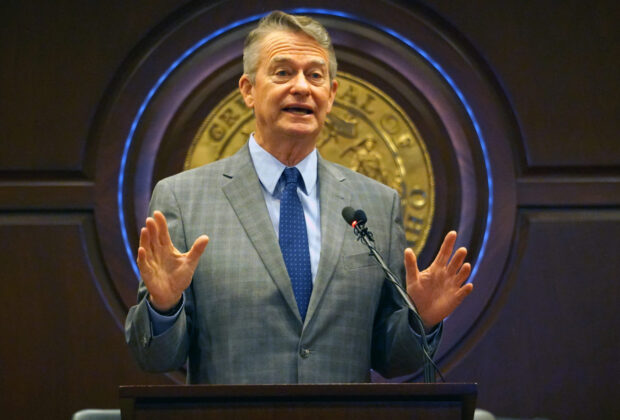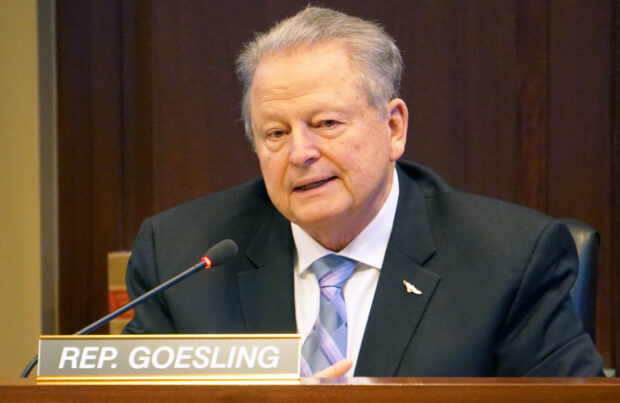Following two days of testimony, the House Education Committee voted unanimously Wednesday to advance Gov. Brad Little’s five-year, $223 million teacher pay proposal.

Wednesday’s vote represents one of the top education bills of the session clearing its first major legislative hurdle.
If passed into law, House Bill 523 would provide Idaho’s experienced, effective educators who meet a new set of performance standards a path to earn $63,000 a year following a five-year phase-in.
As things stand now, state payouts for teacher salaries top out at $50,000 per year. Statewide, there are almost 5,000 educators who have topped out on the top cell of the career ladder salary model. The group of teachers topping out includes those with eight years to 25 years of experience.
Little and his advisers said their bill represents their five-year plan to increase pay for those veteran teachers and help districts and charters increase retention by offering an increase in state funding for salaries.
The bill directs the state to increase salaries incrementally through the 2024-25 school year. Next year’s pay increases would cost $32 million, and create a new advanced professional compensation rung that would be placed above the career ladder’s existing residency and professional rungs.
Greg Wilson, Little’s senior adviser for education, said the bill increases accountability to ensure teacher evaluations are accurate and fits within Little’s budget proposals and forecasts.
“There is strong accountability in House Bill 523 for educators and school districts,” Wilson said. “This five-year build out is fiscally conservative and fits within Gov. Little’s conservative, five-year revenue forecast.”
Educators from across the state traveled to the Statehouse Tuesday and Wednesday to voice their support for passing the bill.
“It allows us to effectively manage the district’s budget and maximize our classroom resources,” West Ada School District Chief Financial Officer Jonathan Gillen said.
Quinn Perry, the Idaho School Boards Association director of policy and government affairs, said the bill will help additional financial assistance to districts that use their operational dollars or rely on supplemental levies to offer higher salaries than the state pays out.
“Schools and districts often have to pay more than current state maximum to offer a competitive salary,” Perry said.
Throughout two days of testimony, only Idaho Freedom Foundation Vice President Fred Birnbaum opposed the bill.
Birnbaum praised the bill’s new minimum salary guarantees. But he said the bill is too large and too long of a commitment. Birnbaum also expressed doubts that the accountability provisions will help improve the accuracy of teacher evaluations. Birnbaum pointed out that 98 percent of Idaho teachers have routinely earned identical overall evaluation scores of “proficient” on their evaluations.
“We don’t believe, given the history we’ve had over the last five years, that is likely to lead to accountability,” Birnbaum said.

In the end, Rep. Bill Goesling, R-Moscow, led the push for House Education to advance the bill.
“My district is ground zero for why this bill is important,” Goesling said. “Our school districts that border surrounding states are challenged to attract and retain our most important resources — our talented teachers.”
Superintendent of Public Instruction Sherri Ybarra welcomed the committee’s vote to advance the bill.
“I am very excited,” Ybarra told Idaho Education News after the vote. “I am happy for veteran teachers. It’s a step in the right direction to show teachers we supported them.”
House Bill 523 heads next to the House floor with a recommendation it passes. Expect the House to take the bill up before Monday’s deadline to transmit bills between the two legislative chambers.
Community college budget
Lawmakers approved a modest budget increase for the state’s growing community college system.
The proposed budget would provide $48.2 million in state general fund dollars to the two-year schools. This would represent a 0.9 percent increase from this year’s budget, and more or less mirrors Gov. Brad Little’s request.
The Joint Finance-Appropriations Committee passed the community college budget with no real discussion, but with some dissention. Three of the committee’s four Democrats — Sen. Janie Ward-Engelking of Boise and Reps. Melissa Wintrow of Boise and Sally Toone of Gooding — voted against the proposal.
But with the committee’s 15-3 vote, the community college budget now heads to the House and the Senate.
The state’s four community colleges — the College of Western Idaho, the College of Southern Idaho, North Idaho College and the College of Eastern Idaho — receive funding from the state, student fees and tuition and local property taxes.
Idaho Education News reporter Kevin Richert contributed to this report.
